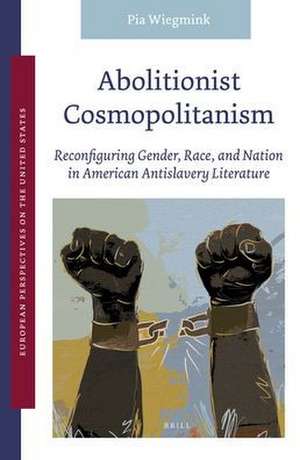Abolitionist Cosmopolitanism: Reconfiguring Gender, Race, and Nation in American Antislavery Literature: European Perspectives on the United States, cartea 4
Autor Pia Wiegminken Limba Engleză Hardback – 21 sep 2022
Preț: 738.96 lei
Preț vechi: 901.16 lei
-18% Nou
Puncte Express: 1108
Preț estimativ în valută:
141.40€ • 148.03$ • 116.100£
141.40€ • 148.03$ • 116.100£
Carte indisponibilă temporar
Doresc să fiu notificat când acest titlu va fi disponibil:
Se trimite...
Preluare comenzi: 021 569.72.76
Specificații
ISBN-13: 9789004520929
ISBN-10: 9004520929
Dimensiuni: 155 x 235 mm
Greutate: 0 kg
Editura: Brill
Colecția Brill
Seria European Perspectives on the United States
ISBN-10: 9004520929
Dimensiuni: 155 x 235 mm
Greutate: 0 kg
Editura: Brill
Colecția Brill
Seria European Perspectives on the United States
Notă biografică
Pia Wiegmink is Professor of Slavery and Dependency Studies at Bonn University, Germany. She is co-editor of German Entanglements with Slavery (Routledge, 2017) and American Cultures as Transnational Performance (Routledge, 2021).
For Abolitionist Cosmopolitanism, Pia Wiegmink received the 2020 EAAS Rob Kroes Award.
For Abolitionist Cosmopolitanism, Pia Wiegmink received the 2020 EAAS Rob Kroes Award.
Cuprins
Acknowledgements
List of Figures
1 Introduction
2 Mapping the Field
1Abolitionist Literature Matters
2Transnational American Antislavery Literature
3Abolitionist Cosmopolitanism
3 Friends of Freedom: Female Editorship and Transatlantic Communities of Affection in The Liberty Bell
1Abolitionist Print Culture and Gift-Giving
2The Gift Book as Chronicle of Transatlantic Affective Communities
3Fundraising for the Cause: The Annual Boston Antislavery Fair
4 Gendered Global Geographies of American Antislavery Literature in The Liberty Bell
1Haiti: Edmund Quincy’s “Two Nights in St. Domingo” (1843)
2Egypt: Maria Lowell’s “Africa” (1849)
3The United States: Elizabeth Barret Browning’s “The Runaway Slave at Pilgrim’s Point” (1848)
5 Travelling Beyond the Slave Narrative: African American Women’s Autobiography
1Revisiting the Slave Narrative: Discourses of Travel in Harriet Jacobs’s Incidents in the Life of a Slave Girl (1861)
2Reports From Russia and Jamaica: Nancy Prince’s Narrative of the Life and Times of Mrs. Nancy Prince (1850)
3Interlude: Nancy Prince’s Travel Account The West Indies (1841)
4Reversing Slave Itineraries: Eliza Potter’s A Hairdresser’s Experience in High Life (1859)
6 Travelling Letters of Antislavery: African American Women’s Epistolary Writing
1Sarah Parker Remond’s Epistolary Writing on Black Freedom of Movement
2Harriet Jacobs’s First Public Letter (1853) and Women’s Transatlantic Antislavery Epistolary Battles
7 Antislavery, Immigration, and German American Women’s Literature
1Alexander von Humboldt, Carl Schutz’ “True Americanism” (1859), and German American Abolitionist Self-Fashioning
2German Antislavery Sentiments and the Cult of German Womanhood in America: Talvj’s The Exiles (1852)
3German American Utopian Communities: Mathilde Franziska Anneke’s “Uhland in Texas” (1866)
4Coda: Ottilie Assing’s Writings on Frederick Douglass
8 Conclusion
Works Cited
Index
List of Figures
1 Introduction
2 Mapping the Field
1Abolitionist Literature Matters
2Transnational American Antislavery Literature
3Abolitionist Cosmopolitanism
3 Friends of Freedom: Female Editorship and Transatlantic Communities of Affection in The Liberty Bell
1Abolitionist Print Culture and Gift-Giving
2The Gift Book as Chronicle of Transatlantic Affective Communities
3Fundraising for the Cause: The Annual Boston Antislavery Fair
4 Gendered Global Geographies of American Antislavery Literature in The Liberty Bell
1Haiti: Edmund Quincy’s “Two Nights in St. Domingo” (1843)
2Egypt: Maria Lowell’s “Africa” (1849)
3The United States: Elizabeth Barret Browning’s “The Runaway Slave at Pilgrim’s Point” (1848)
5 Travelling Beyond the Slave Narrative: African American Women’s Autobiography
1Revisiting the Slave Narrative: Discourses of Travel in Harriet Jacobs’s Incidents in the Life of a Slave Girl (1861)
2Reports From Russia and Jamaica: Nancy Prince’s Narrative of the Life and Times of Mrs. Nancy Prince (1850)
3Interlude: Nancy Prince’s Travel Account The West Indies (1841)
4Reversing Slave Itineraries: Eliza Potter’s A Hairdresser’s Experience in High Life (1859)
6 Travelling Letters of Antislavery: African American Women’s Epistolary Writing
1Sarah Parker Remond’s Epistolary Writing on Black Freedom of Movement
2Harriet Jacobs’s First Public Letter (1853) and Women’s Transatlantic Antislavery Epistolary Battles
7 Antislavery, Immigration, and German American Women’s Literature
1Alexander von Humboldt, Carl Schutz’ “True Americanism” (1859), and German American Abolitionist Self-Fashioning
2German Antislavery Sentiments and the Cult of German Womanhood in America: Talvj’s The Exiles (1852)
3German American Utopian Communities: Mathilde Franziska Anneke’s “Uhland in Texas” (1866)
4Coda: Ottilie Assing’s Writings on Frederick Douglass
8 Conclusion
Works Cited
Index







